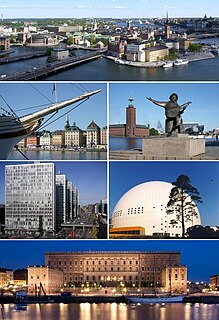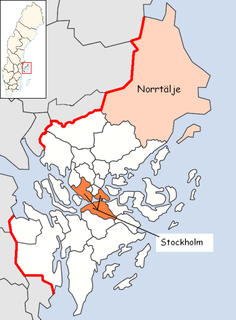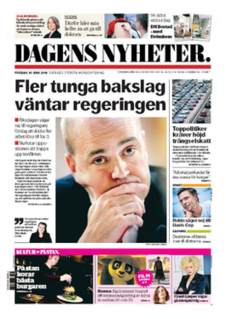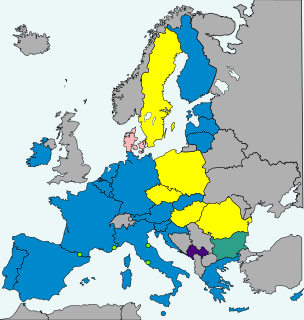
Malmö is the largest city of the Swedish county of Skåne County, the third-largest city in Sweden, after Stockholm and Gothenburg, and the sixth-largest city in Scandinavia, with a population of 312,012 inhabitants in 2017 out of a municipal total of 338,230. The Malmö Metropolitan Region is home to over 700,000 people, and the Øresund Region, which includes Malmö, is home to 4 million people.

Stockholm is the capital of Sweden and the most populous urban area in the Nordic countries; 960,031 people live in the municipality, approximately 1.5 million in the urban area, and 2.3 million in the metropolitan area. The city stretches across fourteen islands where Lake Mälaren flows into the Baltic Sea. Just outside the city and along the coast is the island chain of the Stockholm archipelago. The area has been settled since the Stone Age, in the 6th millennium BC, and was founded as a city in 1252 by Swedish statesman Birger Jarl. It is also the capital of Stockholm County.
Sweden Democrats or Swedish Democrats is a social conservative and right-wing populist political party in Sweden, founded in 1988. The party describes itself as social conservative with a nationalist foundation. The party has been described by others as far-right, national-conservative, and anti-immigration. Jimmie Åkesson has been party leader since 2005.

Skåne County, sometimes referred to as Scania County in English, is the southernmost county or län, of Sweden, basically corresponding to the traditional province Skåne. It borders the counties of Halland, Kronoberg and Blekinge and connected to Capital Region, Denmark by the Oresund Bridge. The seat of residence for the Skåne Governor is the city of Malmö. The headquarters of Skåne Regional Council is the town of Kristianstad.

Dalarna County is a county or län in middle Sweden (Svealand). It borders the counties of Uppsala, Jämtland, Gävleborg, Västmanland, Örebro and Värmland. It is also bordered by the Norwegian counties of Hedmark and Trøndelag in the west.

Norrtälje Municipality is a municipality in Stockholm County in east central Sweden. Its seat is located in the city of Norrtälje.

Örebro County is a county or län in central Sweden. It borders the counties of Västra Götaland, Värmland, Dalarna, Västmanland, Södermanland and Östergötland. It is frequently culturally divided into the hilly northern region of Bergslagen, where mining and metallurgic industry have been important since the Middle Ages, and the southern Mälardalen of lakes and farms.

Kumla Municipality is a municipality in Örebro County in central Sweden. Its seat is located in the city of Kumla.

Laxå Municipality is a municipality in Örebro County in central Sweden. Its seat is located in the town of Laxå.

Nora Municipality is a municipality in Örebro County in central Sweden. Its seat is located in the city of Nora.

Örebro Municipality is a municipality in Örebro County in central Sweden. Its seat is located in the city of Örebro.

Gotland Municipality is a municipality that covers the entire island of Gotland in Sweden. The city of Visby is the municipality's seat.

Dagens Nyheter, abbreviated DN, is a daily newspaper in Sweden. It is published in Stockholm and aspires to full national and international coverage.

Södertälje is a city and the seat of Södertälje Municipality, Stockholm County, Sweden. As of 2016, it has a population of 71,774 inhabitants.
An urban area or tätort in Sweden has a minimum of 200 inhabitants and may be a city, town or larger village. It is a purely statistical concept, not defined by any municipal or county boundaries. Urban areas referred to as cities or towns for statistical purposes have a minimum of 10,000 inhabitants. In 2010, there were 1,956 urban areas in Sweden, covering 85% of the Swedish population.

Stockholm Public Transport, formerly Stockholm Transport and commonly referred to as SL, is the organisation running all of the land based public transport systems in Stockholm County.
Social welfare in Sweden is made up of several organizations and systems dealing with welfare. It is mostly funded by taxes, and executed by the public sector on all levels of government as well as private organizations. It can be separated into three parts falling under three different ministries. Social welfare is the responsibility of the Ministry of Health and Social Affairs. Education is the responsibility of the Ministry of Education and Research. The labour market is the responsibility of the Ministry of Employment.

Kiruna Municipality is a municipality in Norrbotten County in northernmost Sweden. Its seat is located in Kiruna. It is the northernmost municipality in Sweden, and at 20,715 square kilometres (7,998 sq mi) is Sweden's geographically largest covering roughly 4.604% of its total area.

Sweden does not currently use the euro as its currency and has no plans to replace the krona in the near future. Sweden's Treaty of Accession of 1994 made it subject to the Treaty of Maastricht, which obliges states to join the eurozone once they meet the necessary conditions. Sweden maintains that joining the ERM II is voluntary, and has chosen to remain outside pending public approval by a referendum, thereby intentionally avoiding the fulfilment of the adoption requirements.


















